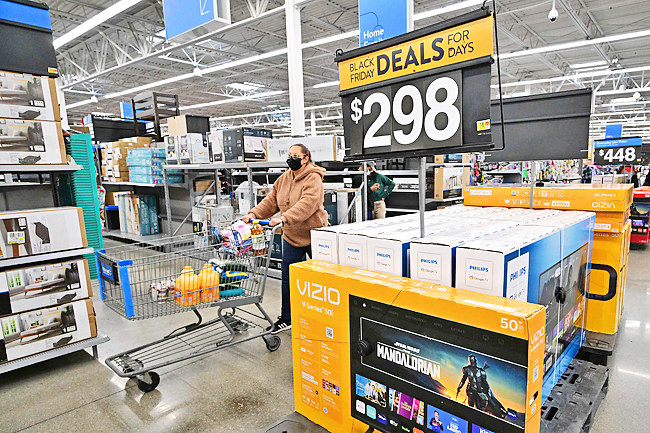NEW YORK (AFP) – Once again, US retailers are gearing up for ‘Black Friday’, the annual shopping extravaganza that kicks off the holiday gift-giving season with price discounts and chaotic crowds.
Held the day after Thanksgiving and increasingly copied in Europe and beyond, ‘Black Friday’ has evolved into a catchphrase for a multiday period in late November that concludes with ‘Cyber Monday’ and the weekend in between the two events.
This year’s markdowns are expected to be especially deep, reflecting the pressure stores feel to lure in a US consumer jaded by still-high inflation and the upheaval of the pandemic years.
Still, forecasters expect heavy consumer traffic. The National Retail Federation (NRF) predicts more than 182 million consumers will shop in stores and online over the shopping weekend.
That turnout – equal to more than half the US population – would top by 16 million last year’s level and constitute a record since the trade group began tracking the period in 2017.

While the actual Black Friday period remains crucial, stores have actually been offering deals for weeks marketing Black Friday sales earlier and earlier in October.
The early bargains reflect hyper competition among retailers trying to win over consumers inundated with offers in digital spaces.
“Get set for a promotional frenzy hitting your inbox and surging across social media,” said head of money and markets Susannah Streeter at Hargreaves Lansdown.
The discounts are expected to be deeper than in the last few years.
PICKY CONSUMERS
Especially hot items this holiday season include mainstays such as Lego and Hot Wheels, along with Barbie, which is still basking in the afterglow of this summer’s blockbuster movie.
Game consoles remain in demand, along with Meta Quest 3, a virtual reality headset, new iPhones and tablets.
With inflation for groceries and other staples still a factor, many shoppers will only buy items if they are on sale.
“The shopper will be looking for items they really want and need, rather than simply buying lots of things on impulse,” said Global Data’s managing director Neil Saunders. “That’s not necessarily a good thing for retailers.”
Saunders said retailers “are carefully targeting discounts to certain items” instead of “having a promotional free-for-all”.
Economic pundits have worried for months that the US economy could slip into recession. Instead, commentators have repeatedly been impressed by the “resilience” of US consumers.
MIXED ECONOMY
The NRF has projected overall holiday sales growth of between three and four percent, which would mark a return to the pre-pandemic trend of more modest increases.
While inflation has slowed compared with the level of a year ago, interest rates remain at their highest level in some 22 years following a string of interest rate increases by the Federal Reserve. That can lead to punishing interest costs if consumers don’t pay off their credit cards.
Households have less excess cash compared with a year ago following pandemic relief programs. Also those with student loans are back on the hook for interest payments after the moratorium expired.
On the positive side, American consumers have been bolstered by a strong labour market and low unemployment. “The employment situation has remained incredibly resilient throughout the year and has been the backbone of the US economy for the first nine months of the year,” said analyst Zachary Warring at CFRA Research.


















































